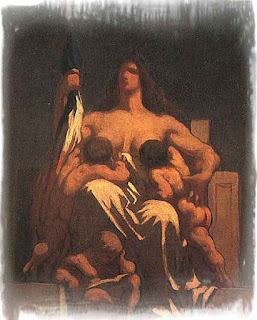I had something completely different in mind today, but I couldn’t finish writing. Actually, writing what I really want to post led me to something else completely. Anyway, here’s an oldie but goodie...
* * *
-=[ Terminal Uniqueness ]=-
“Oh, that? Girl, I stopped suffering from terminal uniqueness a long time – thank GAWD!”
-- Overheard on subway, IRT 6 train, NYC
Part of the enjoyment of living in New York city is that you’re always catching snatches of conversations, like the one quoted above. Two young, professional women discussing men and heartbreak. I loved that phrase “terminal uniqueness.” The way I see it, terminal uniqueness is the feeling that many of us get when we’re going through rough times: nobody knows how I feel. No one has ever felt what I felt. My pain is unique and therefore no one can understand what I’m going through, and I’m gonna die a wretch.
I’m exaggerating a little bit here, but I think we all go through this thought process to some degree. We feel our problems are unique to ourselves and in that way, we develop an attachment to our pain: my pain is unique! We seem to be saying. And so it is: we have our own little unique crosses to bear and bear them we do: proudly, like scars earned in battle.
Fact is, however much you’re hurting, someone has you trumped, sweetie. There’s that old cliché about having mourned going without shoes until seeing someone with no feet. Sure, it sounds a lot like what our parents would say about eating all the food on our plate (“Do you know there are kids starving in Africa… ”), but the thing about clichés is that they become clichés because they are often true. We want to hold on to our pain, as crazy as that sounds, because for many people our pain defines us, makes us unique.
Much of what we do is process -- much of letting go involve grief and grief has its stages. Don’t get me wrong: processing is important, but there comes a time that “processing” becomes another excuse to stay stuck. After a while, it’s merely disguised indulging. Or, worse, we don’t allow ourselves to feel completely what we’re feeling. We try to make too much sense of it, we analyze it to death. Ask someone what they’re feeling, and more often than not, they’ll come back with what they’re thinking about what they’re feeling. The majority of the time most of us cannot name what we’re feeling.
I’ll tell you this much: there’s a big difference between feelings and emotions. Emotions are the “Drama Queens” of our inner life. Feelings are the reality. Yes, we have pain, it’s part of life, but then we also have what we bring to that pain. If you’re “processing” the drama, you will continue processing until the cows come home. All the crying, gnashing of teeth, ripping of clothes, loss of hair, will not get you through life with any measure of sanity.
Neurosis is a poor substitute for real feeling. In order to feel genuinely, we have to drop the drama and get to the feeling -- the core. And we have to feel completely, without fear, without contraction. Crying? If you think crying is an indicator that you’re moving through the “stages” of grief, you’ve merely taken a concept and distorted it. You have to feel -- really feel, completely and totally, opening up to whatever it is so that you become more and more transparent, allowing the love within you to shine through.
I recently had a client come to me and tell me, before we even started our session, “Please! Stop telling me to open up my heart, because I’ve been opening and opening and the shit is still hitting the fuckin’ fan, Eddie!” LOL
I had to laugh, because I totally understood. It’s part of life. There are no guarantees and just because we’ve decided to effect a shift, it doesn’t necessarily follow that the world will now dutifully conform to our perception and roll out the Red Carpet. Now, that’s the process! Co-workers, lovers, relatives will all “conspire” to fuck up our little strategic plan for better living. It’s their job, actually. Our job is to drop the terminal uniqueness and realize that taking it all so deeply personal is the true source of our suffering.
Love,
Eddie
![[un]Common Sense](http://3.bp.blogspot.com/-SHkSXUux500/TmHfh9LEe_I/AAAAAAAABwM/Z6tn2-Pe7z4/s1600/connexion-top_%2B002.jpg)
















